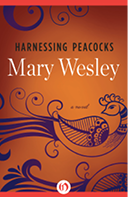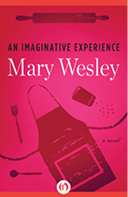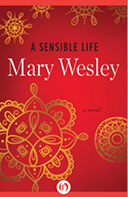Part of the Furniture (29 page)
Read Part of the Furniture Online
Authors: Mary Wesley

Juno’s door was ajar; he crept in. The room was chilly, the fire dying. He moved cautiously to put wood on the fire.
Juno said, ‘I am not asleep, too anxious. Did you telephone?’ She raised herself on her elbow.
Robert said, ‘They are sleeping, their temperatures are normal. He says, I spoke to the doctor, that you can see them tomorrow. They are going to be all right.’
Juno said, ‘Oh, God! Oh, Robert, you are crying.’ She reached up and caught hold of him. ‘Why don’t you get in, then we can cry together?’
Demurring, Robert said, ‘What about your cold?’
She said, ‘I will give it to you,’ and held back the bedclothes, so he got in and later, when she woke after sleeping in his arms, he thought he should make light, excuse what had happened. He said, ‘Oh, darling, this is what’s called one thing leading to another,’ and she said, ‘I thought it was called pleasure, a hugely enjoyable pleasure, I had no idea. What a surprise.’ When again he prevaricated, ‘You have a cold, I should not have—it was an aberration, I am too old, much too old—’ she said, ‘Oh really?’ and, ‘What nonsense,’ and, ‘Stop quibbling,’ and, ‘Have we time to do it again before we get up to go to the hospital?’
He simply said, ‘Yes.’
FORTY-SEVEN
J
UNO LEFT HER PARCELS
in the restaurant cloakroom and came back to sit in the bar, choosing a table for four. Then, agreeably tired from a morning’s shopping, she stretched her legs and looked about her. A few tables away a middle-aged couple were sharing a joke, in the far corner a group of men discussed business, a young couple perched close together at the bar, and at the table next to her a solitary man read the
Evening Standard
and sipped vodka and tonic. As Juno sat down he lowered his paper, then raised it again.
Seeing her arrive, the barman came across with a glass of champagne on a salver. ‘Good morning, madam, Mr Copplestone’s order, he’s reserved a table for lunch and will be a few minutes late.’
Juno said, ‘Thank you, that’s just what I need,’ and sipped the champagne.
The solitary man lowered his newspaper and said, ‘Juno.’
Turning to look, Juno said, ‘Jonty.’ The street door opened abruptly and a party of people came in talking loudly. Juno quickly swallowed another mouthful of champagne.
Jonty said, ‘What are you doing here?’
‘Meeting my family for lunch, and you?’
‘Meeting my daughter.’
‘You married?’
‘I married a girl called Sheena.’
‘I remember her.’ (I bet his mother was pleased. I must not say suitable, sexy or rich.) ‘And how is your mother?’ Pleased that her voice was steady.
‘She died.’
Juno said, ‘I am sorry. And your aunt?’
‘She died, too, soon after my uncle. My father died ten years ago, heart attack.’
Juno thought, and the old labrador? He must have popped off first. She said, ‘Oh dear, sad.’ She sipped and replaced her glass on the table. Her hand was quite steady. She said, ‘I didn’t know. You have a daughter?’
‘Yes.’
‘Just the one?’
‘Yes. Juno, what are you—’ Jonty’s question was lost in the brouhaha of another group, who pushed past on their way to the restaurant. When they were gone, he said, ‘You look wonderful, you haven’t changed at all.’
Juno said, ‘You look pretty much the same yourself. What is your daughter called? Is she beautiful?’
‘Victoria. I think her beautiful. She’s late.’ He seemed worried by this.
‘Girls are apt to be.’
‘She was meeting some boyfriends.’
‘Girls do that, too.’
‘It’s the boyfriends I worry about.’ He sounded pettish.
Juno said, ‘Well, these days there’s the pill.’
Jonty flushed and gulped the rest of his vodka. ‘You are married?’ He sounded aggressive.
Juno said, ‘I am.’ He had not changed all that much; broader, definite suspicion of stomach, coarser perhaps, the black hair was going grey and sliding away from this temples. It was considerably thinner, too. He was on the wane.
Jonty said, ‘This is impossible. Can’t we go somewhere quiet and talk?’
Juno said, ‘I am meeting my husband, and you are meeting your daughter.’ (The old Jonty would have giggled and said, ‘Let’s arrange for them to have lunch together.’)
Jonty said, ‘We couldn’t find you, we couldn’t find your aunt.’
Juno felt a surge of rage such as she had only experienced once before, on the occasion when she quarrelled with Bert in the cowshed. She said, ‘You can’t have looked very far, she’s in the telephone book. She is still alive.’ She drank a mouthful of champagne. Then she said, ‘I was only part of the furniture.’
And Jonty exclaimed, ‘No!’ so loudly that people looked round and stared.
‘And Francis?’ Juno said. ‘What’s happened to Francis?’
‘Francis was killed in the war.’
Juno said, ‘I did not know.’
A comfortless silence grew between them, to be broken by Robert swinging in from the street exclaiming, ‘So sorry to be so late, darling, please forgive me. Did the barman give you a drink? Oh, good, he did. You must have another to keep me company. I’ll wave to him.’ He waved. ‘We will have a bottle. The boys are coming, aren’t they? I am terribly sorry, but I have to telephone, make two calls. Do you mind? Are you starving?’
Juno said, ‘No.’
Robert said, ‘I’ll try not to be long,’ and was gone.
Jonty said, ‘Is
that
your husband?’
Juno said, ‘Yes.’
Jonty said, ‘But he is
old
.’
Juno said, ‘But gorgeous. We took a short cut through the generations. It took me for ever to persuade him to marry me. He was afraid it would make me look ridiculous and him more so.’
‘He is certainly not that,’ Jonty watched Robert’s departing figure. ‘How old is he? Seventy?’
‘Eighty.’
‘And you are?’
‘Forty.’
‘And happy?’
‘Oh yes.’
Sounding sincere, Jonty said, ‘I am glad.’
Juno said, ‘And you?’
‘Oh, you know, so-so.’ He looked, she thought, rather sheepish, as if he was about to say something along the lines of, ‘We rub along,’ but his face, lit up and he said, ‘Ah! Here comes my daughter.’ And then, ‘Good God.
Who is she with
?’ and the blood drained from his face as Inigo and Presto hurried up to their mother, exclaiming, ‘Ma, we are late, forgive us.’ And, ‘It’s all Victoria’s fault. This is Victoria; Victoria, this is our mother. We couldn’t get her out of the shops in Carnaby Street. Look at all this, Ma,’ and they waved Union Jack carrier bags. ‘You should see the rubbish she has bought, and look at these which we bought for Bert, d’you think he will wear them?’ They snatched from a bag Union Jack pants. ‘The very tops, the true essence of vulgarity.’ Both were in a state of high spirits.
Juno shook hands with Victoria, who was indeed beautiful, and said, ‘What have you done with your aunt, boys?’ She was not looking at Jonty, avoiding his eye.
‘She’s on her way,’ Presto said. ‘She said don’t wait for her, start lunch. She’s gone over the top, bought presents for everyone back home in Montreal, lashed out in a big way. We couldn’t stop her,’ he said, laughing. ‘Didn’t try. We are starving.’
And Juno, aware of Jonty beside her, giving him the chance to revive, said, ‘He is talking about my sister. If you remember my mother went to Canada; she married again and my sister is the result. Two weeks younger than her nephews, another example of short-cutting through generations. My mother died a year ago. These are my twins, Inigo and Presto. Darlings?’ She gestured an introduction.
Easy-mannered and casual, they shook hands with Jonty. ‘How d’you do?’ Their eyes, black and palest blue, wandering incuriously past him towards the restaurant, anticipated lunch.
Juno said, ‘Sit down, for God’s sake,’ as the young people milled about her, ‘you are making me giddy.’ But Victoria exclaimed that she must go to the lavatory, and Jonty that it was time to leave, his wife would be waiting for them at Wilton’s. He said to Victoria, ‘Hurry up, then,’ which she did, disappearing and reappearing just as Robert rejoined them, having made his telephone calls, but in time to register the scene and Jonty departing. Robert said, ‘Hello, everybody, ready for lunch?’ Noting her pallor, he very quietly asked Juno, ‘Are you all right, darling?’
Juno said, ‘I hope so. That was Inigo’s father, Robert.’
Robert murmured, ‘So I observed, and Presto’s?’ For Jonty, shaking hands with Presto, had visibly flinched.
Juno said, ‘Killed in the war.’
Robert sighed, ‘Ah—Watch out, he is coming back.’
Jonty, reaching the street, had turned about and, leaving Victoria standing on the pavement, came up to Juno and with his face close to hers hissed, ‘If those two are fucking my daughter, it’s incest.’
And Juno said, ‘Yes, it is.’
Mary Wesley (1912–2002) was an English novelist. After she published her first novel at age seventy, her books sold more than three million copies, many of them becoming bestsellers. Her beloved books include
Jumping the Queue
,
The Camomile Lawn
,
Harnessing Peacocks
,
The Vacillations of Poppy Carew
,
Not That Sort of Girl
,
Second Fiddle
,
A Sensible Life
,
A Dubious Legacy
,
An Imaginative Experience
, and
Part of the Furniture
, as well as a memoir,
Part of the Scenery
.
All rights reserved, including without limitation the right to reproduce this ebook or any portion thereof in any form or by any means, whether electronic or mechanical, now known or hereinafter invented, without the express written permission of the publisher.
This is a work of fiction. Names, characters, places, events, and incidents either are the product of the author’s imagination or are used fictitiously. Any resemblance to actual persons, living or dead, businesses, companies, events, or locales is entirely coincidental.
Copyright © 1997 by Mary Wesley
Cover design by Linda McCarthy
978-1-4804-5063-9
This edition published in 2013 by Open Road Integrated Media, Inc.
345 Hudson Street
New York, NY 10014











